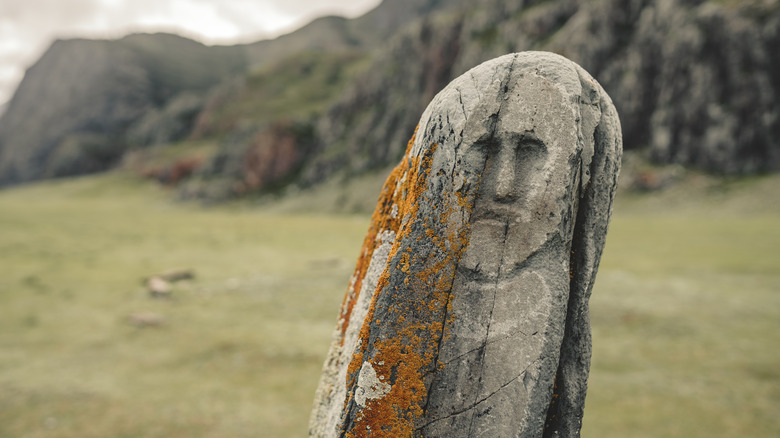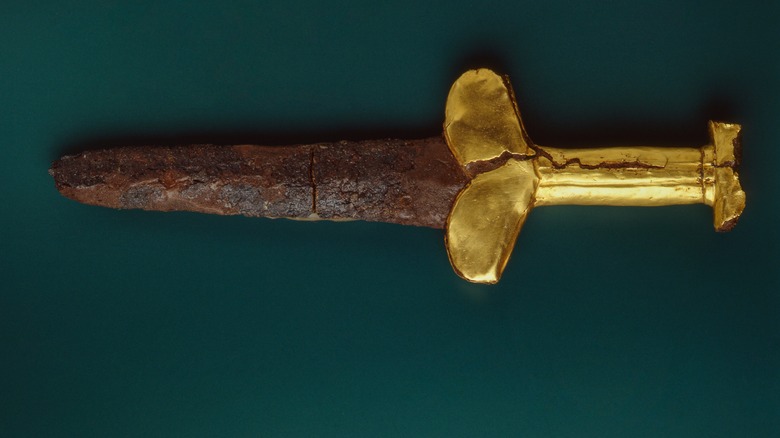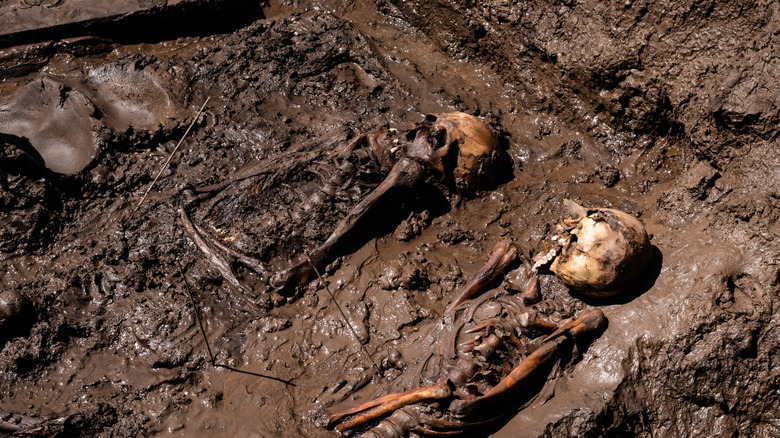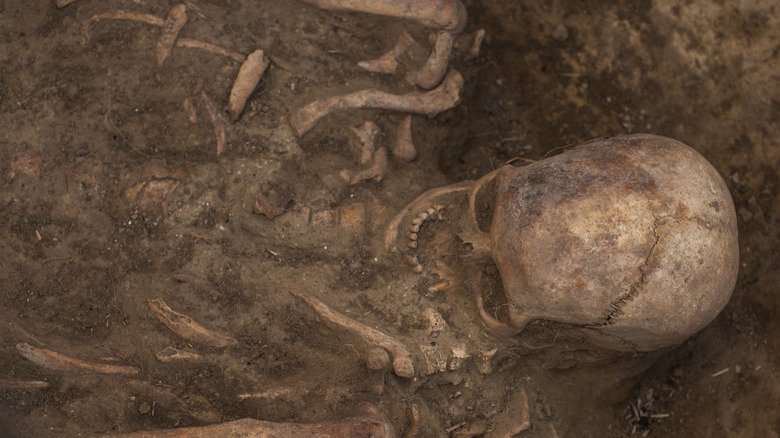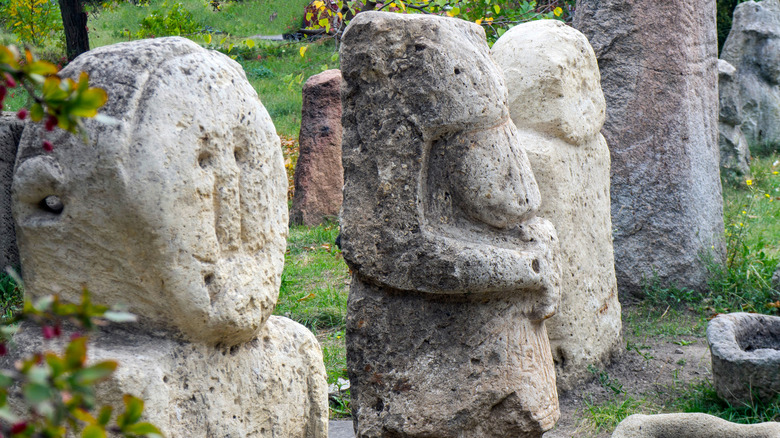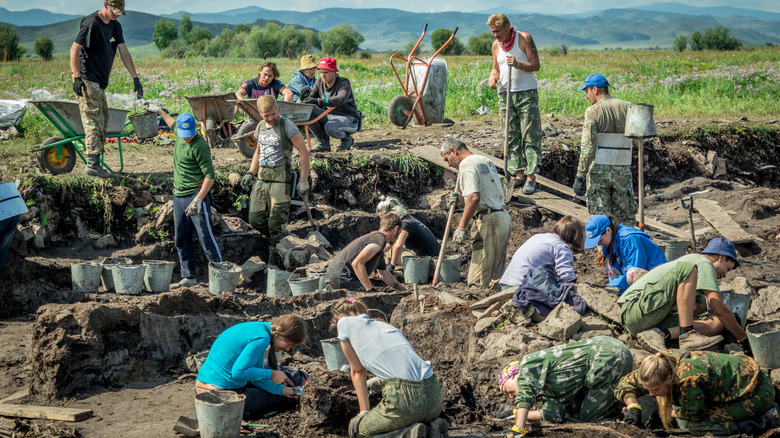The Scythians Had A Horrifying Tradition With Their Prisoners Of War
Sacrifice may seem a little outdated these days, but it's been a big part of human history that is tied to religions from around the world. It's still around today, but modern religions tend to find things to sacrifice that aren't living or breathing and that sure the heck aren't people. Like how Catholics sacrifice something they enjoy for Lent, etc. Back in the old days of humanity, though, living sacrifices were common. As Live Science points out, ancient Egyptians, Aztecs, Romans, Vikings, and just about every other area of the world weren't exempt from the practice of exchanging lives for hopeful favors from whichever deities they set out to honor. Then there were the Scythians and their horrifying tradition of sacrificing prisoners of war.
As The British Museum explains, the Scythians were a group of nomads who traveled across Asia but who had their roots in Siberia. These weren't a timid people but rather a warrior people so fearsome that the ancient Greeks and Persians wrote stories that served as warnings about attacking these folks. And if these two empires of such known military acumen were terrified of the Scythians, it's safe to say they were a force to be reckoned with on the battlefield, but that's not where their terror-invoking practices ended. It was much better to be killed in battle against the Scythian people than brought back as a prisoner of war and sacrificed in an exceedingly brutal manner.
How they sacrificed prisoners of war
These days, there are international rules that tell us how countries are allowed to treat prisoners of war, which were put together during the third Geneva convention, according to the International Committee of the Red Cross. And those rules can be summed up by one tenet: prisoners of war must be treated like people. The part that's important for our topic is that you aren't allowed to sacrifice people, but these rules had no bearing on the Scythian people, and their method of sacrifice was truly dark.
The ancient Greek historian known as Herodotus wrote about these sacrifices in his "Histories," in which he says that one out of every 100 prisoners of war was subject to a brutal sacrifice. The Scythians would first douse the prisoners in wine in what was likely an anointing process that mirrors that of other religious rituals from different parts of the world. The prisoners would then have their throats cut and their blood drained into bowls. As World History Encyclopedia explains, the Scythians would pour the blood onto a ritual sword that sat at the top of a sacrificial mound made of bundles of wood. While some were busy pouring the blood, the body was desecrated by cutting off the right arm of the corpse, which was then tossed in the air and left to lie wherever it happened to land. When they were finished sacrificing, they'd simply leave the remains on the ground, with no burial of any sort.
More on the sacrifices
Though the Scythian language didn't really survive the test of time, Greek historians drew parallels between their pantheon and that of the Scythian religion, and according to Herodotus' writings, the Scythians sacrificed to their version of Ares more than any other god. They went so far as to build a type of open-air temple or shrine to the figure, and it was here they sacrificed their prisoners in such a horrendous fashion.
The writings say they would carry vast bundles of wood and pile them high and "three-eighths of a mile wide" to be used to hold a platform. They were forced to bring in "150 wagon-loads" of wood each year in order to keep their sacred mound usable because the rainy season would drown the wood into virtually nothing as it sank into the mud. On the top of the mound, they'd place a single sword — a special iron sword that served as an idol to their deity. This is the spot where the ritual leaders would poor the blood during the sacrifices. Some of these mounds have even been found by archaeologists in Russia, but we'll get to that in a bit.
Those killed in battle underwent horrifying customs as well
The only reason you'd want to be killed in battle with a Scythian rather than being taken as a prisoner of war is simply so that you weren't subjected to any desecration while you were still alive. Those who fell to these warrior people didn't have their corpses treated with the kind of respect we think of in modern times.
Again, Herodotus' "Histories" brings us an explanation of the brutal customs the Scythian people had when it came to killing on the battlefield more than 2,000 years later. According to this historian, Scythian warriors weren't paid a solid wage for joining their volunteer army but instead received a share in the plunders if they brought the head of the person they'd killed in battle to their leader. Otherwise, they were out of luck.
And they did more than simply remove the head — once it was off the body, they'd scalp it. They actually collected these scalps (along with the skin from the dead soldier's right hand) as a sort of status symbol that they'd tan and soften to use as small towels or turn into a number of things — quivers for arrows, jackets, and other clothing items, etc. Herodotus also notes that some Scythians would skin the entire person so they could turn them into a large swath of human leather. Even if Scythians hadn't been fierce warriors, this would be enough to strike fear into any enemy.
Prisoners weren't the only ones sacrificed
One could argue that at least some prisoners of war were understandable collateral damage back in B.C. times. In the midst of war, killing is what it's all about, as unfortunate as it is. Now, there are many better avenues the human race can take to solve differences, but we can't change the past. Soldiers enter armies to kill and die, so if a soldier from the opposing side is sacrificed, at least it plays into what they signed up for. But Scythians seemed to have a thing for sacrifice in general. Sure, they brutally sacrificed their prisoners, but according to Britannica, they weren't the only ones being sacrificed.
Apparently, men held a lot of sway among the Scythian peoples. So much so that their burial customs called for men to be sent to the afterlife with all kinds of fancy things that would make their deaths just a little more pleasant. You know, things like golden figurines, symbols of wealth and stature, and, of course, people. The wives of men would be sacrificed to follow their husbands to death. Horses were also sacrificed here as well, and since they themselves were a symbol of status, it follows suit. Then there were the poor servants. If serving a master throughout life wasn't bad enough, being sacrificed to serve them for eternity takes the cake.
Evidence of Scythian sacrifice
The evidence for Scythian sacrificial practices is almost all second-hand. According to The British Museum, the reason for this is simply that the evidence that has been found suggests the Scythian people didn't have a written language, so the majority of our knowledge of anything Scythian comes from old sources written by the prominent empires in the area. Those being, of course, the ancient Greeks, ancient Persians, and ancient Assyrians. Probably the most well-known is Herodotus' "Histories," which The Conversation says were published in the 5th century B.C. Historical records are nice, but they're written by humans, who we know all too well are fallible creatures, so it's nice to have multiple lines of supporting evidence. Luckily, we do.
As World History Encyclopedia explains, there are a few different archaeological sites that have unearthed evidence that supports Herodotus' claims. At the Arzhan dig sites in Russia, researchers have found a couple hundred pits containing the remains of once-living offerings, including ample horse and human bones, the two beings Herodotus points out as the Scythians' favored sacrifices. There have also been discoveries of other sites that contained a similar mixture of horse and human remains that seem to support the ancient Greek historian's claims of sacrifices honoring deceased people of importance, though we have yet to find any hard evidence showing the method in which these people were sacrificed. For that, we'll have to take Herodotus' word.
